2004-2007 DAMONGO PROJECT OVERVIEW
In early 2004 a shipment of 240 pounds of books was forwarded to teachers from Damongo, the same village where I had lived as a teenager. The teachers evaluated the materials and advised us on what books they needed most. It was decided to fundraise t$8,000 required to purchase and ship a 20 foot container of books for local schools.
The response to our request for books from Central Alberta schools districts was astounding, so we expanded to a 40 foot container for $11,000. Fundraising and the collection of books began. All books came to my garage where they were unpacked, re-sorted and re-boxed. Soon one container became two, and in July of 2006 two forty foot seacans left Red Deer with 56,000 pounds of books which were delivered to over 50 primary schools in the Damongo area of the Northern Region.
Some larger Ghanaian schools got up to five half ton loads of books. As well we took a large number of teaching resources which were distributed to 300 local teachers at training sessions in Tuna and Damongo. Each teacher took home some new ideas about how to teach English and resources to help them do it. One of the teachers won a door prize for having the largest class - 167 grade six students in one room. There were a dozen more teachers with numbers very close to his, and perhaps half the teachers had class numbers of 90 students or more. No wonder it is hard to get young Ghanaians to choose teaching as a profession.
We spent four and a half months in Africa and returned home in February 2007. Before we left Ghana, we were asked to provide more teacher training in the future.
CONTRIBUTORS
We wish to thank Ingrid and Karsten Nossack of Nossack Fine Meats, Red Deer for warehouse space and the seven Alberta Schools districts including Red Deer Public, Red Deer Catholic, Chinook's Edge, Wolf Creek and Lethbridge for donated books. Resources came to us from as far away as New York and California. A major contributor was The Rotary Club of Edmonton South which donation $8,000. toward shipment and purchase of books. Norm must have a master's degree in filling-and-filing forms! As well our gratitude goes to Knox Presbyterian Church for donation of $8,000. Special thanks to Barb Cormack who helped with that. Gord Bontje was our largest personal donor, but thank you to all donors. Many thanks to the Catholic Diocese of Damongo who supported us in so many ways including warehouse space, a network to outlying schools, expertise, transportation and wonderful camaraderie. Special thanks to Bishop Philip, Laz, Augustine, and Suzie Zook.
Andy Buruma kindly helped us secure containers and Universal Aide helped with funding and expertise on international shipping. The girls of the north thank employees of Alberta Treasury Branch who supplied and filled 150 backpacks. Also our thanks to libraries of Central Alberta, and Edmonton Public Library which donated hundreds of books.
TRAVEL BLOG
Feb. 13, 2007 - Red Deer, AB
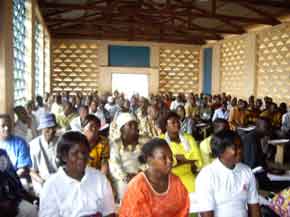
Teachers at the Tuna Workshop
The time between our last entry and our return home was flat out hectic as we worked to complete our project. During the few days before we went to Tuna for the second teacher in-service we delivered books to more schools, helped a local lady make peto(local beer), and put resources together for the teachers. We had a really full truckload as we headed off 100 km. west then north on the Wa highway to Tuna. We passed through villages with the circular mud houses that had been plastered with cow manure and we saw the endless headloads of water and wood being carried along the road. In one village where we stopped only boys gathered around the truck, and then we saw the girls silhouetted against the setting sun coming back from the dam with headpans full of water.

Kids outside checking on what their teachers are doing inside
The presentation was very successful with over 150 teachers sitting on backless benches from 9:00am to 4:00pm. These teachers were keen and attentive, very receptive to MP's presentation. They loved their duotangs with paper, the books and supplies, especially the glue sticks and the little globe pencil sharpeners. (Thank you Lacombe Library for these crowd pleasers!)
We had taken to carrying extra books, supplies and wellness kits in the truck to give away whenever the opportunity arose. One of those deliveries of wellness kits was made to a Lovi village where we were rewarded with our first (but not last) live chicken. Fortunately for us our night watchman was quite willing to look after it for us and get it into our freezer for future "chop".
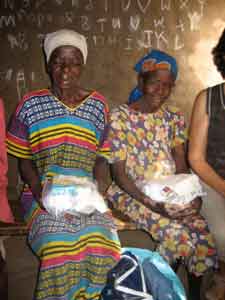
Delivery of ?wellness? kits
There were some schools that we had visited more than once and it was a pleasure to see supplies that we had previously delivered being used. Posters were up and plans were being made for storage and/or distribution of the books once they were stamped. In some cases the priests had been the delivery men for their diocese. Often they had a large area to cover with many schools under their care, as in Tuna. When Fr. Sylvester took a load of books they were put in the warehouse and the teachers from four schools were invited to share them. They did very well until they came to the one set of encyclopedia. Then they called Fr. Sylvester, asking for his help in deciding who should get it. The final decision was for each of the four schools to take one quarter of the encyclopedia set. When Father told us the story, we sent another truckload of books with him which included three more sets of encyclopedia.
The week before our departure was cleanup time. We cleaned out the warehouse using many of the supplies for the 43 teacher resource kits for the newly created Teacher Resource Library, a lending library for the teachers in the Damongo area. Next we gave away all of the things remaining at our house, and that was the most fun. We had a party for the people we had worked with and gave away many door prizes. The real sought after prizes were the folding camp chairs which were given to the best drumming and dancing duos as judged by Laz.
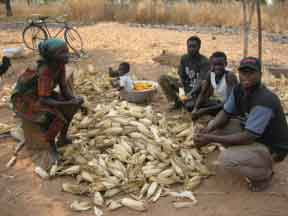
Cobs of corn
During the last week we also said goodbye to our many acquaintances - the girls and staff at St. Anne's Girls Senior Secondary School(SAGISS), the priests and sisters that we worked with, our initial contact in Damongo Susie Zook, our driver Mahama, night watchman Philemon, our housekeeper Benny and the Frafra family from down the road. This family helped us learn about the life of a subsistence farmer by inviting us to participate in farming activities as they happened such as when they picked, shucked, stripped and bagged corn. We were always made to feel welcome whenever we stopped by so we gave them a parting gift of books for the children and a blanket for the chilly 20C nights. The next day we got a chicken in return.
During the week we were also the guests of honor at a party at SAGISS. They danced, sang and presented us with gifts in appreciation for their new library, computer room, bicycles and the backpacks. It was a fair trade.
There were many fine times from this trip that we will always remember, but neither of us will miss the 44 C heat, the sand-filled air during Harmattan season of the constant bush fires as farmers burn off the elephant grass. It was good to arrive home to see our families, but we have very warm memories of the many fine people we met on our journey. We feel very blessed to have had such a wonderful opportunity, and once again we thank all the people that supported the Tools for Schools Africa project.
With our most sincere appreciation,
Marilyn Ganger and Marilyn Pottage
January 15 , 2007
The schools in the Northern Region were closed for almost a month over Christmas, something we had not anticipated, so we headed south to holiday a bit, but also seeking information on the items that disappeared at the port. We had several meetings, went to the Canadian High Commission for help and finally filed a police report. After visiting a police station, both Marilyn G and I decided we did not want to cross the legal line here. The prisoners stood about six feet behind the desk, leaning through the bars, watching the goings on. The floor was dirt, and the cells were very crowded. I told Gary that I thought some of the officers had a steady diet of Claude Van Damme movies for breakfast!
Anyway, we headed back north on January 5th, and when we got as far as Kumasi we had a traffic accident. Mahama was driving slowly down a dirt road when a taxi, at high speed, tried to pass us, swerving right to avoid a pedestrian walking on the left side of the road. He sideswiped us, so I told Mahama to hit is and follow him until he stopped. We got out to look at the damage, which was not as bad as I thought it might be. Most the damage was caused by a sharp spike sticking straight out from the centre of his right rear hibcap. The taxi driver was 25, did not have a license and obviously did not have two nickels to rub together. While we decided how to handle it, we sent Mahama off with him in his taxi to get a hacksaw to remove the spike that had caused the damage, and to repair our running board as much as possible. They finally returned and the taxi driver sawed off the spike as requested. We had threatened to call police, so he was shaking badly, and when I told him that I was giving him a break, he got down on his knees to thank me. I decided to fight fire with fire, so I told him that I was putting a curse on him that would bring him bad luck every time he drove recklessly. In the end the owner took the cab from him and he is jobless, so I guess that curse is just going to go to waste!
When we got to the Kumasi guest house, I got sicker and sicker until I realized it was malaria and began taking malaria medication. We laid over an extra day and then again headed north, stopping in Yendi to visit Susie, the new owner of the Explorer. She told us the story of the local Yendi chief who was beheaded by a rival faction of the family and spent 4 and a half years in the freezer as they could not bury him without his head. Another story for another day, but such a good laugh.
Last Saturday we had a teacher training session for 140 teachers from the Damongo area and closer villages. We did not know what to expect, even whether the teachers would come. We arrived an hour before the session was scheduled to begin, and there were twenty five or thirty people there before us. We had handouts ready, and door prizes of teaching resources for all. In order to hand out the door prizes in an orderly fashion, we had decided to write numbers on their hands in felt pen, something we do in Canadian schools upon occasion. We never stopped to think that black marker does not show well on black skin!

A large class
The teachers were most appreciative and the evaluations very positive. Most had no understanding of vowels, and had never had any instruction in how to teach reading or spelling in a language many of them do not understand well themselves. So we went back to the basics, but they were intrigued with the concepts, and there were many of those 'teachable moments' that every teacher strives for.
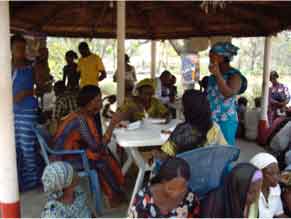
Enjoying lunch
Today we are in Tamale. We are getting used to that road now although one can never stop teeth from rattling on the incessant washboarding. We are here to get some photocopying done, and to get extensions on our visas. The copies are for the next teacher training session we are running in Tuna this Friday for 150-160 teachers, and the visa extension is necessary as they would only give us two months at the airport on the way in. We hope that we will be able to accomplish both tasks and get back to Damongo tonight.
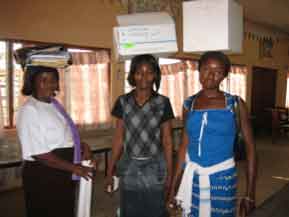
Students leaving with resources
In the end the immigration officer liked his pen very much, his Canadian pin making him an honorary Canadian even more, and the bag of chocolate chip cookies we passed around the office sealed the deal.
We got our passports back, with the necessary extension. The last three weeks here promise to be the busiest yet as we still have a lot of books in the warehouse, so wish us good health and good luck.
Marilyn P.
Dec. 27, 2006
Merry Christmas to all from Ghana!! We are doing ?very fine? and as they say here, ?very kickin'. We have been to the south eastern coast where the Volta River meets the ocean for a few days and then we moved up the mountain to a place called Haphzibal Christian Centre for the 24 - 27th.
We had been invited for their Christmas concert and supper. The first part was a group of adult singers. The childrens? skits and African dancing stole the show. Our supper was very good and much different being of the appetizer variety. We added our own Christmas pudding and a glass of wine at the end. There is no commercialism here, no lights, and very few presents are exchanged, and those that are given are mostly food. We have much to learn from the Africans in this regard, but just a few lights besides the two candles we had would have been so nice.
We are back in Accra today and feeling the full effects of the harmattan. The sun is one big red ball of fire during most of the day, but especially at sunrise and sunset.
We visited the woodcarver's shops yesterday and the bead market today. The crafts that are made here are usually with wood, leather, straw and glass. The beads are often centuries old and were once used as currency in the trading of goods. We have learned to enjoy the African way and have acquired the knack of taking our time in bargaining for whatever we wish to purchase.
The signs for the names of shops continue to impress us: Sweet Is Not Always As Usual, God Knows Brakes and Transmission Shop, etc.
Our driver, Mohammed, has been very forthcoming with information about Ghanaian life and has answered any and all of the questions that we have asked. In the evenings, MP is teaching him to read and he is doing extremely well. In his words after he read his first book, "Amazin'!!" My job is just to read with him and to encourage.
Thinking of all of you and wishing you the very best in 2007.
Love Marilyn G
Dec. 27, 2006
A belated Christmas greeting to you all, and best wishes for the New Year! We have been out of range of the internet in our travels, and sometimes out of phone range as well. I was able to talk to most of the family, some longer than others as the calls are often cut off with no warning. Sometimes we just are not able to send or receive.
It was an exciting day when we finally got Thompson, my 1995 Ford Explorer. I was beginning to think we would not get it until after Christmas, but Jacob drove it north, arriving in Damongo December 16th. The paint had been quite badly damaged in places during shipment, but it is running like a dream, and we love having it here. It has been carrying many loads already.
You?ve heard me speak of Mahama, our driver. He is illiterate but has amazing maps of the entire country of Ghana, and its cities, in his head. In the evening while we are on the road I have been giving him reading lessons, and his progress has been amazing. He is already reading road signs and billboards in Accra, and slogans on the back of taxis. He is now reading his third book. Not bad for about 8 lessons. The desire is certainly there, and that counts for so much. Below is one of his early notes to us. Translation: ?Dear Aunties, I am very happy to write you the note to express my gratitude for what you have done for me.?
Many of you know about the backpacks that were put together for the girls at St. Anne's Secondary School. The Treasury Branch was a big help with them as were other organizations. I just want you to know what an explosion of joy results from your generosity. We placed all the backpacks on a table, and each girl came up and chose one, but we did not allow them to open them until every girl had one. When we finally allowed them to open them, there were murmurs, and few small cries of delight, and all of a sudden the roof just about flew off the building. The girls held up item after item, just screaming, crying out in joy, and often jumping up and down. A few girls sat and cried. Many came and thanked us.
A video of the girls opening their gift backpacks
A couple young people from Seattle, Casey and Laura, live in staff quarters quite some distance away. They had no idea what was happening, but when they heard the roar, they told us later they thought nothing less than a lion had attacked the school!! Many of the girls came up asking what the items were. What is lotion? What do you do with it? What are bath beads? How do you use them? There were no happier girls on the planet that day, and their joy did not lessen in the days following. Thank you to all of you who helped make such a fine thing happen. Before we left that night, I thanked them for a wonderful Christmas. There could be no better feeling that having been a part of the backpack project.
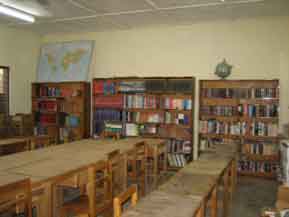
Library at SAGISS completed.
Just before Christmas we traveled to Addah (Ada), an area east of Accra where the Volta River dumps into the Gulf of Guinea. One morning we took a boat down the river, enjoying the villages on the banks of the river and the fishing boats coming back upstream. Our driver was with us. He got back into the truck and said, "It was amazing to see the water of the river joining the water of the sea. I will remember it all my life until my bones are rotten!"
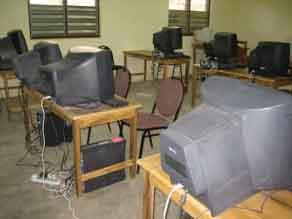
Computer lab installed by Casey at SAGISS.
Just before Christmas we were in downtown Accra, and met a lady from New Zealand on the street. She invited us to join her for Christmas in the mountains, which we did. We especially enjoyed with drumming and dancing of the kids, and a three part chorus led by a Barry White sound-alike. They were fine people, and when we signed the guest book, we discovered the people two entries ago were from Red Deer, Alberta! Now, that was a coincidence!
Now we are back in Accra. Before Christmas we came south to speak to the powers that be regarding items that had been taken from the container at the port. A report is to be filed by today, so we will see if we meet with any success in getting some of the things back. Of greatest importance is my laptop as I have all my PowerPoint presentations on it, and have 140 teachers coming for an in-service on teaching reading on January 13th. I cannot get word to the small villages for the teachers not to come, so I am really hoping that the computer and projector surface. Tomorrow we will see what progress has been made. We told them we are not leaving without it.
The work in the month ahead is onerous. We have shipped out a lot of books, but there are still many, perhaps two thirds, in the warehouse. Some of those are to be delivered over quite a distance. (We are finding accommodation and food to be very reasonably priced here, but gas is not!) The fact that the schools took from December 15th to January 9th for holidays has held us up. And, we understand that often the teachers do not arrive back that first week, so really it is about a month off. While the kids are out, we cannot deliver books as the schools are closed. So, we will be going top speed as soon as they are open again. Well, as 'top' speed as we can when at 4 pm it is still 36 degrees.
Best wishes to you all for a wonderful year of 2007. I think Gary is counting days until we are back as most of the meals in the freezer have been used!
Love,
Marilyn P.
Dec. 13, 2006
Greetings from Damongo, Ghana! We are well and happy.
We have moved from the guesthouse and are now living in a three bedroom bungalow. This bungalow is built around a central courtyard with every room opening onto it. The setup is interesting. The kitchen is across the courtyard from the dining room and the toilet, in a separate room, is across the courtyard from the bedrooms. The furniture is minimal. We are bargaining with a carpenter to build us a shelving unit in exchange for some of the wood that was used for blocking the vehicle in the container. Sounds promising! We are also employers and have a driver, a housekeeper and a night watchman complete with two dogs. Unless we want to, we no longer have to drive, cook, shop, do laundry or clean the house. Our house is across town from the secretariat with fields all around us. This country living comes with roosters in every nearby compound trying to outdo each other.
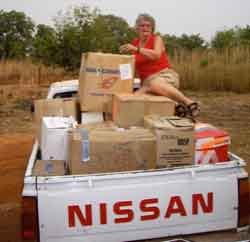
A truckload of goodies
Since the arrival of the containers we have been busy sorting and handing out the supplies to the various schools and to those that could transport them to places like Tuna, Bole, Tinga and Bususu. Below is the third delivery of the morning in 40 degree heat, and a school receiving delivery. The third picture is a formal thank you from one of the schools.
Because the priests of the diocese were in Damongo for a retreat, we decided that sending supplies with them was the only way that distant schools that really needed the supplies could get them.
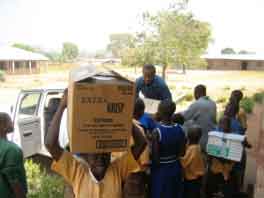
Carrying a box
Approximately a dozen truckloads of books and equipment have left the warehouse so far. We ourselves have been busy closer to Damongo.
We were very excited to see the two book shelves in St. Anne's Girls Secondary School fill up and overflow to the point where they will need to have two more shelving units built. Tables have been built for the computers that we had earmarked for that school so SAGISS should have a functioning computer lab with 16 matching 4 Gig Dell computers before Christmas.
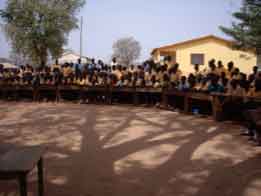
A gathering
Fortunately for us and the school, Casey, a Peace Corps volunteer with an IT degree, is at the school until June. This will ensure that the lab remains functioning and that people are trained to take over when he leaves. Below is the setting up of the library at SAGISS.
We have visited many schools of various levels, sizes and condition. One of the things that we have been checking out is the security level that would be available for any supplies that we would leave. Unfortunately those that really need the help often have no library and no place to lock in the books and equipment.
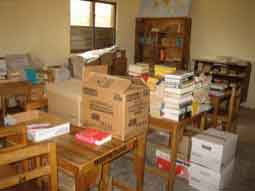
A full library
Another school that has been getting our special attention is the Presbyterian Primary and Junior Secondary School. We took over supplies and visited the school last week. After talking to the head mistress and observing the classes we offered to come and spend the day teaching in the classes. MP chose to teach the P3 class decoding techniques and World geography, and MG taught the P6 class World geography and watercolour painting.
The challenges we met were the large classes (54 and 52), our accent and use of language, and the interest that the other classes showed in what was happening by hanging in through the windows and door and noisily jockeying for a better view. "Erase? was not understood; they "Clear" the page instead. "Fill the space" should have been "Occupy the area". Marilyn P was corrected - ?She is saying it wrong boys and girls. She means the NORF pole?. By the end of the school day at 1:00pm, we had sweat buckets and were exhausted. This morning we decided not to work at all, just have a late coffee.
We have been getting lots of Ghanaian cultural experience too. We shucked field maize last night at the neighboring compound, we 'backed' a baby (tied a baby onto our back with a piece of material), used a mortar and pestle to pound fufu, bargained at the local market, carried a huge loaded pan of wood on our head and have eaten kenke with the other teachers at the school. Although we think that we are 'fitting in', our white skin still makes babies cry, and small children feel our white legs just to remind us how white we are.
We have decided to go south for the holiday. While we are at the coast in the heat, and in the noise of the pounding surf of the ocean, sitting under a palm tree, we will think of all of you.
Marilyn G
December 6 , 2006
This blog covers the time from Accra to Damongo. We arrived in Accra on Nov. 17 and were graciously escorted, guided and hosted by Father Lazarus.
We stood on the Gulf of Guinea and looked south in hopes of seeing Antarctica (just kidding) and then visited the coffin maker?s shop which does custom work in making specialty coffins to suit personalities. We saw a coffins designed in the shape of a cow, lion, airplane, car, coke bottle and a beer bottle.
We are at about 4 degrees N latitude having crossed the equator several times while traveling to Ghana. This is also the harmattan season, the harmattan being the wind that blows south from the Sahara desert bringing dust and heat. As a result the farther north we travel, the drier it is getting and we are beginning to get 'pruney'. We did a test to see how much lotion we could apply before it did not absorb and ran out of lotion.
The containers arrived in port on Oct. 28 and as of Nov. 17 were still in Tema. We spent the morning of Mon. Nov. 19 with the National Catholic Secretariat going over the paper work to ensure a speedy delivery of the containers to Damongo. We were assured that the containers and the vehicle would be on their way directly. We set out for Damongo that afternoon.
Along with Father Stephen we traveled with Laz for about five hours to Kumasi, the second largest city in Ghana, where we spent the night. There we were as night was falling over the city, the A/C was on in the vehicle and the dust was swirling around us when we heard our first Christmas carol of the season - Michael Bolton singing 'O Holy Night'. The next morning we started with a relatively empty Land Cruiser, but then we stopped at the roadside vendors from whom we purchased plantain, oranges, bananas, loaves of bread, and the largest juiciest pineapples that I have ever seen. The main shopping areas are open air stalls set up along the streets or in the markets similar to our farmer markets. Goods and produce are also offered to travelers at stop signs or along areas of slow traffic by the vendors who wander between the vehicles offering bananas, small bags of water, shoes, car mats, phone cards, fabrics, toilet paper, pictures, booster cables, plastic dishes, etc. Most carry the items in large pans balanced upon their head.
As we headed north the road was fairly good for a considerable distance, but was littered with broken down vehicles waiting for repairs. At Buipe Father took us on a short cut over what he referred to as safari road. Quadders would love the road with its bare rocks and wash outs. We bounced our way into Damongo to the tunes of Don Williams and a Jamaican singer, Don Carlos, in time for supper. Arrangements had been made for us to stay in the comfort of the Unity Centre Catholic Guesthouse, where we have been ever since. We eat at the restaurant and have been introduced to Ghanaian foods such as fufu, banku, groundnut soup and TZ.
We have met many people since arriving. Our first visitor was Susie Zook, a Texan on a mission in Ghana and our contact and project partner from its onset. We have visited schools and met teachers and students.
The project has been well received by everyone here. We have come to realize that all parents, no matter where, want the best for their children and for most that means a good education.
Marilyn G.
December 6 , 2006
It has been a long time since I did a blog. Sorry, there are a number of reasons, none of which matter. But, I am online today and will get this away unless the server crashes before I am done. It has crashed once in the last half hour already.
I still do not have my vehicle, which is still sitting in the port, so it is hard to get to the internet but we are hoping to have it by the weekend.
We are now in Damongo, as you will read in Marilyn G's blog. It is very interesting to be back after such a long time. There are many changes, but the first noticeable one is the increase in population. There are more villages, many of them where it used to be only field and forest. Even the existing villages are much larger. Still, life has not changed much for the average person. Most are living in mud houses with thatched grass or tin roofs, and it appears the majority are still subsistence farmers. The town of Damongo itself is less organized than it used to be, and less prosperous looking although there are more small one room shops.
I went to see our house and the hospital where I used to work, and both structures are still there but looking like they could stand a new coat of paint. Still, they have aged better than I have! The house has changed little although all the trees near it are gone, and other buildings have been built fairly nearby. The hospital is much larger and a new ward is being built by a German organization. One of the biggest changes I have noticed is the decreased amount of culture. There used to be drumming and dancing almost every night, and talking drums in the night. There used to be quite a few locally produced handcrafts of good quality. Now there is enough TV and radio available that the evenings are not spent in traditional ways, though cooking is still on the fire in the courtyard in the same large pots. The women are still pounding fufu and the stew still smells fine!
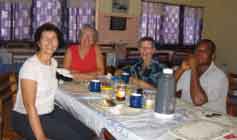
Marilyn G., Marilyn P, Susie and Mahama
We are being accommodated at the Catholic Church Diocese Guest House which was built about ten years ago, and is very nice. Since we arrived here we have been treated royally and everyone has gone out of their way to make us feel welcome. We have electricity quite a bit of the time, and when it is on, we have a fan in our bedroom. It looks like we will be moving quite soon to a different location in order to have a place where we can cook.
We have had some interesting events. One was a night drive last week over the cut-across road, the equivalent of a bad pasture road in Alberta. The lady in the front seat (me!) spotted a snake on the road, so Mahama reversed and turned into an attacking Rotweiller, driving back and forth over the snake and then pinning it under the wheel. He got out of the truck to club it to death. Africans do not like snakes!! We refused to have it riding in the van with us, dead or not, so it was tied to the front grill for the ride home.
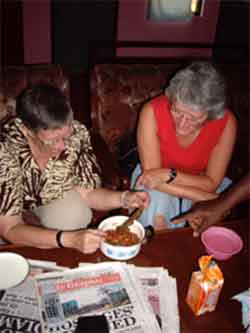
Susie and me sharing puff adder stew
The next day Mahama arrived with a special treat for us - puff adder stew! To my amazement it was really quite tasty although filled with bones. Did you know snakes have a lot of 'ribs'?
We had some interesting and frustrating times trying to get the containers to Damongo, but they finally arrived last Saturday morning. We were walking down to breakfast and we spotted a truck with a container sitting at the roadside. So, Saturday Dec 2 ended up being 'unloading' day. It was quite a lot different than loading day as we had no pallet jacks, and in fact no way to get the full containers off the flatbed. So we backed the trucks up to the warehouse door and women walked to the back to the truck to pick up headloads of boxes. Sometimes they carried two boxes, and even the boxes of encyclopedias that weighed 80 pounds! Of course many men were helping too, but it was the four women who really impressed us with their work ethic. We were finished unloading both containers about 2:30, so we dashed all our helpers a used blanket, and they were all thrilled. Below: Unloading the containers, one box at a time.
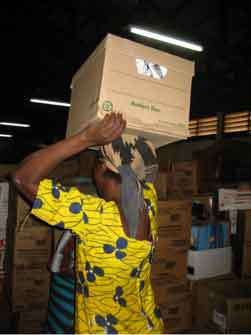
A woman carrying a box
The issue of payment for the transportation of the containers from the coast to Damongo has been haunting us for some time. The money was in the account in Accra, but the drivers had not been paid or given gas money to get back to Accra, so they thought they should be collecting 20 million cedis ($US 200) per container. They sat here with the trucks for three days as we tried to get it sorted out, and finally yesterday they were on their way. Getting the containers themselves off the flatbeds without a crane was interesting too. In case you are wonder how that works, you drive the truck under a tree, chain the container to the tree limb, and back up the truck until the container is raised just a bit off the flatbed. Tree trunks and branches are then inserted under the container. The truck then drives to the off loading location, and a winch pulls it off the back of the flatbed, rolling on the tree limbs. It hits the ground with a mighty crash. Some priests who didn't know the containers were being off loaded thought there had been an earthquake!
Now we are sorting inventory from the container with the help of three strong young men. Already four truckloads have gone to the girl?s secondary school, and they are more than pleased with what they have gotten. Of course there are many more schools, and we will reach the fifty or so that we can.
We have also set up a teacher in-service day for teaching reading and spelling on Saturday Jan 13th. Because teachers are coming from a distance we have agreed to pay for their lunches although transportation costs will be theirs. We are looking at setting up a few other sessions in different locations so that we can reach the outlying teachers who have even less at their disposal.
One thing that has really slowed us down is that the kids all are writing exams until Dec 15, and then school is out until Jan 9th. That really limits the time we can be in the schools, but we will do what we can. There are more teachers here who are part of a student employment program than there are trained teachers. Some teachers that we met at Buipe are volunteers, hoping that if some money does become available, they might be in line for some. We have visited a number of schools and will be visiting many more.
The farmers in the area are burning off the tall elephant grass, so we wake to the smell of smoke in the air, and MG noted that she has not seen a truly blue sky yet because of the constant smoke haze. A goodly number of telephone poles have been burned accidentally by the fires, so we have had no land line into Damongo for some time. As you drive down the road you can see smoking posts and the headers hanging on lines near the ground when the posts have been burned away. Needless to say, it has not improved the access to phone or fax. If it is important, we drive several hours over poor roads to Tamale to send a fax. The closest Barclay?s bank is also Tamale, so it is good that the cost of living is cheap as we don?t have to make the trip often.
It has truly seemed like Christmas since the container arrived. We open up our food boxes and exclaimed with joy over almost every item. Iced tea!! Stoned wheat thins! Almonds!!!! Granola bars!! It was the same with the cargo in the containers. Shampoo! Here's toothpaste!!! Glue stick!! So, I think the container cargo will be our Christmas for this year. We appreciated each one of the items as much as if it had been the most wonderfully wrapped gift. For Christmas we will likely be traveling. We are thinking about going into Burkino Faso as we have to leave the country in order to have our passports stamped again. Our visit 'visa' is only good for two months so if we leave and come back again it will be renewed.
We have a cell phone now, and it has been great to talk to family. It is cheap enough that we will try to call some friends before Christmas. All for now. We hope you are all well. Just one question - are you serious about Ed Stelmach getting elected as premier? Really? Or is this a joke......
Love,
Marilyn P.
November 19, 2006
Good morning from Accra, Ghana. We arrived yesterday as planned and are now in the process of trying to get the containers out of the port and shipped to Damongo. They are still in the port, just sitting there.
Our final stay in Mombasa was an all inclusive beach holiday along the Indian Ocean. We went snorkeling again, but the runoff from all the rain in Kenya has made the water murky and difficult to see much more than coral and starfish. Even so, the swim in the ocean was pleasant and enjoyable.
Mombasa is much like any other African city that we have seen with its narrow streets in the old city, old buildings with their faded beauty, and the inevitable bustle, noise, smells and color of the market.
I saw a sign yesterday that said "Season's Greetings? and I was thinking that we are very far from that. Then I realized that all the decorations will be up in Red Deer and the craft sale is probably this weekend, or the Festival of Trees. The hot weather is not conducive to thinking about Christmas just yet, although there are Christmas decorations for sale.
Many signs in Accra are religious. Jesus Saves Pharmacy; God is the Answer Grocery Store; God is Trust Tire Store, etc. The fact that the only people that we have met are the priests, sisters and workers at the Good Shepherd Guesthouse Bar and Restaurant make this even more believable for us.
Miss all of you.
Marilyn G
November 18, 2006
We arrived in Accra after a five and a half hour flight from Nairobi to 42 degree steam. We were met at the plane by Father Lazarus, a priest from Damongo, who took us to the Catholic guest house for supper and a bed. The traffic in Accra is terrible - just short of gridlock just about all the time from what I can see. As we sat in traffic the hawkers appeared at the vehicle window non-stop, selling everything from ornaments to newspapers, fruit, toilet paper, car floor mats, crafts, bread, etc.
The containers are still in the port in Tema. There is a 3,000 dollar charge that the Catholic Church in Damongo has already paid, but we are accruing daily storage charges and are trying to get the containers on their way north. To that end we will stay in Accra until Monday morning, hoping to get it sorted out and the containers on the road.
We got a phone call last night from Susie, who has been our contact in Damongo for most of this project. We have emailed and talked for months but have never met. We will be in Damongo at the end of the week and hope for an internet connection there although the Ghanaian internet is notoriously unreliable. ?Hope everyone is well.
Marilyn P.
November 7, 2006
Well, here we are in very wet Zanzibar. Yesterday was Stephen's birthday and it the family occasions that I really miss.
After leaving Ngorongoro Crater and the Safari, we headed back to Nairobi, but the bad part was that I brought a little wildlife of my own with me. So far Marilyn G. has escaped, but I have been fighting bed bugs. My goodness, what a trial it is. I have been showering and washing and bleaching clothes until the skin on my hands is as dry as parchment, and my hair is not much better. I think I have the bugs pretty much beat - touch wood.
Once we were back in Nairobi, Miffie arranged a car and driver for us for two days. We went to visit the David Sheldrake baby elephant orphanage. The youngest elephant was just two weeks old. It's mother had her trunk caught and then cut in a snare. Once an elephant's trunk is cut, they have no way of gathering enough food to survive, so she starved to death. The baby was at her side suckling her dead mother when it was found by Samburu people. They got word to the orphanage, and the baby was saved, although they had to give her huge doses or antibiotics because the Samburu had given her cow's milk which can cause pneumonia in elephants. Anyway, all is well. There were ten orphans there at the moment. They stay up to two and a half years, and then they are gradually released back into a controlled environment. Even after they become wild again, the trainers say that when they have babies, they bring the babies back to show to the trainers. Proud mothers are everywhere I guess.
We also visited the giraffe centre where they are attempting to keep the Rothschild giraffes alive. There are nine varieties of giraffes, and Kenya has three. The Rothschild giraffe is different from the others as it has white legs below the knee. We visited a number of other places in Nairobi as well. I think Marilyn G's favorite was the Masaii market. She haggled and negotiated her way into a few treasures. For my part, I bought a brass pass holder. When Kenya was still a protectorate, all the Africans had to carry passes around their necks. I had read about this and knew what it was the minute I saw it. I guess the history part was what appealed to me the most. Ten dollars seemed pretty reasonable.
We left Nairobi very early Sunday after standing in line at the Nairobi airport for a couple hours, but finally we got to Zanzibar. It was pouring then and has not stopped much since then. On the drive from the airport the van was up to the axles in water and the engine was sputtering. It has rained every day, not all day but many downpours that have a lot of water in them. I only brought one pair of sandals so it feels like my feet will be growing either mold or else webbing between the toes very soon.
Today we did a tour to see all the spices growing on the island. In fact, Zanzibar supplies about 80% of the world's cloves and many other spices as well. We saw cinnamon, pepper, cardomon and many other spices growing, and enjoyed smelling and tasting them all. We also visited the slave caves. When the British shut down the slave trade here in the 1870's, the trade simply went, literally, underground. They moved up the coast about fifteen kms north of Stone Town, and simply dug caves in the coral in which to warehouse the slaves until the next shipment. The ships flew French flags to throw off the British, and the trade continued until 1907. From the 1840's, Zanzibar was ruled by a sultan, so there is a heavy Arab influence here. In fact, the first sultan here also controlled the whole coast of East Africa from Somolia south to Tanzania, so there is a very similar culture all down the coast. We also went for a swim in the Indian Ocean, even while the rain continued.
Tomorrow we are heading for the north end of the island and the fine beaches. Hopefully we will leave the rain here! We will be back in Stone Town on the 10th and back in Nairobi on the 11th. There may be time to blog then, or after our train trip to Mombasa.
It is not long until we head for Ghana. We know the containers were at the port a couple weeks ago, so are hoping that the containers will be in Damongo when we arrive, or shortly after.
Marilyn P.
November 1, 2006
Nairobi, Kenya
Well, we are back. It is very difficult to find computers and internet both working at the same time in Eastern Africa! Today we have both, AND free usage thanks to the International Schools Association in Nairobi. A computer with an English keyboard, and enough speed to move between screens is a real luxury, one of the things we certainly take for granted at home.
We have gone many miles and have had many adventures since the last blog. When we last wrote we were just leaving Egypt. It was amazing to see the treasures of Ancient Egypt, something we will never forget. But, we were not sorry to leave the totally insane taxi drivers of Egypt behind. We truly wondered if we'd to get back to the airport alive. They treat driving as if it is a video game, traveling at speeds of 90 kph with about two inches between vehicles, jumping from lane to lane, and creating a new one when none is available. The highlights of Egypt for us were the trip down the Nile, Abu Simbel Temple and seeing the whole treasure trove that came from King Tut's tomb.
We were welcomed in Ethiopia by the Salesian Brothers, a fine group of people who offered us superior accommodation at very reasonable prices. We stayed with them in Addis Ababa before heading north to Bahir Dir. Father Roberto arranged a car and driver, and we started traveling through the beautifully clean Ethiopian countryside. We were so impressed to see well cared for homes and farms. It was a festival day, so there were large numbers of people on the road.
We took pictures of women carrying unbelievably huge headloads of fuel, including wood and leaves, and dried cow patties. To get to Bahir Dir we crossed one of the two branches of the Nile River. The terrain was much like the area around the Grand Canyon, and we descended for perhaps 20 km and then ascended the same amount on the other side. We had had very good roads to that point, but from the time we started dropping into the valley, the road was "under construction" - that is, it had had no attention for the past decade or two. Sheer bedrock stuck up between the rain eroded gullies. It was unbelievable. Our small car scrapped bottom more times than you can imagine, and each time we checked whether we had left the oil pan behind. The one thing we were sure of is that we were NOT going to go home the same way.
We left Addis shortly after 8 am and finally arrived in Bahir Dir well after dark, about 8:30. On the way we gave the driver a lesson on how to dim lights for oncoming cars, something that was unknown to him. He seemed unaware of why all the oncoming vehicles kept flashing their headlights at him!! This on a very narrow two lane highway.
Bahir Dir is on Lake Tana, and on the shores of Lake Tana (and on the islands in the lake) are 22 monasteries built as early as the 12th century. Father Roberto says that Ethiopia was the first Christian country in the world. We took a boat out to some of the monasteries (after a fight between boat owners as to who would get us) and were surprised to find they were built in the round style of many of the African huts. Many of the original icons were still there and also some of the old texts painted on vellum, sitting on dusty shelves. They leafed through the books showing us the original 12th century hand painted vellum pages and allowed us to take pictures.
We could not face what seemed to be certain death on that road so flew back to Addis. Back in Addis, Father Roberto took us to one of his favorite projects, a Street Children Project where boys on the street are taken in and offered an education, accommodation and skill training. It is an amazing project. Both of us were awed by the staff's dedication and the money that is going into the project. At present they are building a new 400 bed facility. They offered us a traditional meal of injera.
We left Addis and flew to Nairobi to be welcomed by Miffie Greer, a friend from the AISA tour of 2003. It was wonderful to see her again. We stayed with her overnight. At seven the next morning we headed out on a local bus to safari into Tanzania. There we were met by our guide Pius (pronounced Puce) who drove us to Lake Manyara. We went on a game drive that afternoon until dark. We saw many animals including baboons, giraffe, hippos, and zebras, and just as we were heading out of the park, a large group of elephants moved very near our vehicle. One huge elephant was no more than a couple arms length away. I was holding my camera tightly as we were wondering if he was going to put his trunk into the vehicle.
That night we stayed at Lake Manyara Lodge, which was pretty luxurious compared to the usual hotels we had been staying in. The food was also fine, as was the hot shower!
Sunday morning we stayed at Lake Manyara before moving on to the Ngorongoro area in the afternoon. We visited a Masaii boma just as the herds of cattle were coming home. The Masaii believe in following traditional customs and live the same way they did hundreds of years ago. They still live in houses constructed from sticks, animal hide and mud/manure, and their diet still consists of blood/milk together and meat. They do not grow or eat fruits and vegetables. As Pius said, ?The Masaii do not know how to cook. They only know how to burn meat." Pius is a "modern Masaii", one who has left the village and traditional ways because he wanted an education. He has done well for himself. He is 27 years old and has been working as a guide for 5 years.
Monday was an all day animal drive in the crater. It measures 15 miles by 12 miles, and the animals that are in the crater pretty much spend their lives there because the sides of the crater are very steep, and animals such as elephants could not get out if they wanted to. The bottom of the crater was less fertile than we had expected, with most of the grass very dry and few acacia trees except around the edges. There are a few natural springs in the crater creating the necessary water holes. In them there are hippos lazing away their days in the sun. One water hole was situated beneath "Pride Rock?, an out cropping of rock where lions kept a keen lookout. We were fortunate to see about a dozen lions throughout the day, several of which would just lie down in the middle of the dirt road and move only into the shade of one of the safari vehicles, resting against the wheel and falling asleep. Even when the vehicle moved on, the lion just slept. One of these sleeping lions we could have touched through the window of the jeep. In the crater were also large herds of zebra, wildebeest, gazelles and cape buffalo. The road out of the crater was rough and very steep, not for the meek.
As we left the lodge and ended our safari we were fortunate to have a leopard cross the road right in front of us. The Big Five are the most dangerous land animals: lion, elephant, cape buffalo, leopard and rhino. We had now seen four of these. Our last animal sighting was of six giraffe crossing the highway as we headed back for Arusha. The trip by bus was long, but we are now in Nairobi once more enjoying our time with Miffie. We leave on Sunday for Zanzibar.
The advice we have for you today: Never take fresh water, laundry facilities, salad, high speed internet, and chocolate for granted. The one thing that we have had the most practice with is patience.
Marilyn P.
October 19 , 2006
Well, hello from the land of the pharaohs.
We have ridden in crap taxis that have had to be push started and today we took the crap train from Aswan. This train was the filthiest I have ever seen, EVER! Over the past week we have seen more than I could ever have imagined and I cannot possibly explain or describe the magnitude of the pyramids. We have seen the mask and the coffins of King Tut and yes, they are just as you see in magazines, all brilliantly gold and bejeweled.
The Egyptian Museum is an all day project, but we were given about 2 hours to cover it all. I think we missed a room or two - maybe complete floors. We did see a sheik at the restaurant where we had lunch in. I don't think that he was too impressed with the food because he fell asleep at the table and no one woke him up. We thought that he had had a heart attack. Turns out he was just really tired, and if you are a sheik, you sleep where and when you choose.
Yesterday I rode a camel. Hojon was very competitive and had to be first all the time. Because I was opening up a sizeable lead, the camel boy thought that I might like him to take a picture of me and Hojon. I had to change the camera battery and by that time the rest of the group had caught up. Then the camel boy got in a lot of trouble because I was getting too far away from the group. Oops. I have seen camels in the fields just grazing, camels saddled and ready for the tourists to ride, and a camel train just walking through town. I may even have seen camel on my plate, but I just couldn't tell the difference. Would you believe that it is mostly tourists that ride camels? One small camel will cost about $800. and a larger one will run at about $1000.US. Donkeys are cheaper and are about $200.US. I am taking orders.
We walked into a store the first night that we were here. It was packed with Egyptian women and every one of them had on a head scarf and a long caftan type garment. Needless to say, we have had a few stares, comments and pictures taken of us. Many people can speak some English, but for this trip we have a guide so he does all the talking.
Usually the prices are very cheap, except for tourists - they always tack on a few extra dollars. Canadians are well liked here as well as in Morocco and Tunisia. If anyone mentions that we are Americans we make it clear that we are Canadians. The only time I should have agreed that we were Americans was when I was in a store trying to buy a large piece of paper. Of course I was using my very best French, and not getting too far. When I finally got my request across and was waiting for the change, I could understand the other customers discussing and making excuses for my "American Francais". Did I let it go? Nope, I made sure that they knew that my bad French was Canadian.
The most awkward situation that we found ourselves in was with the beggars on the streets. We acquired a few pair of socks from British Airways so we decided to give them to beggars or moms with small children. I gave a book that I had finished and the mom was happy! So far, so good. Next we gave a pair of socks to a mom in a group that sat in the same spot ever day - kind of like coffee row. She just smiled and then the laughter started - it was 40 degrees C at the time. Next we decided the next beggar would get the last pair. We realized only after we had given the socks to him, from his look of disgust, that he had no legs under that loose blanket. Ironic, don't you think?
We have many more temples and ancient ruins to see over the next two days and a donkey to ride. It was a good idea to take part in this GAP tour because it is so diversified. When we booked Egypt we thought that it would be safer and I think it is, but there is certainly a police presence everywhere. On our trip to Abu Simbel from Aswan we were riding in a 38 vehicle convoy complete with escorts. Everyone jockeys for position by blaring their horns. Anyway we returned safe and sound without incident.
Much more, but it gets tedious so I'll end it here.
Marilyn G
October 10, 2006
Tunisia is wonderful.? We love this country!
We arrived last Thursday, fairly late.? Friday morning we started out on our quest to find materials for the grade three social studies unit on Tunisia.
Friday was our lucky day.? First we visited the Tourist Bureau and they gave us some wonderful resources - better than we could ever have hoped for.? They sent us down the street to the ?party? house.? We had no idea what that was but it ended up being the guest house for the President. We talked our way in and got two flags. As we were walking down the street taking pictures, a girl in a parked car told us we should be careful what we took pictures of, and then invited us into her car for a brief background and chat.? She is a university student, and she gave us a really good idea of what we need to see in our week here.? She also told us that all Tunisian kids have free education even at the university level, so it is not surprising the country is moving ahead so well.? She and her friend also drove us to a French speaking international school.? We found an English speaking teacher there who is interested in having a student exchange. For the most part we are dependent on Marilyn G?s French which is better than mine, and on reading directions from waving of hands!
We have stayed three nights at Sidi Bou Said (which is 20 km north-east of Tunis); a lovely little village on the Mediterranean.? The water is unbelievably blue; so beautiful and so warm. We have been exploring, taking pictures, buying things for the teaching kits, swimming and lazing on the beach. The most attractive thing besides the sea are the white houses with blue doors.? The whole village is the same with tall dark green cypress and bougainvillea blooming in many colors. It is a painters dream.
A nice lady in an office is letting me use her computer but is standing at my shoulder waiting for me to finish so I guess this is it for now.?? We have one more day in Tunisia and then we head for Egypt and our travels down the Nile. We are next door to the Presidential Palace which we discovered when the security guard told us to get off his beach.? We thought about telling him that we were good friends of the president as we had visited his guest house in Tunis but thought better of it.? Today we head back to Tunis and we fly on Thursday.
Marilyn P.
October 1, 2006
It has only been a couple days since we posted the last blog, but it may be a while before we can post again, so I thought I?d update.
Today was a great day. We started off by foot to see the tanneries for which Marrakech is famous. The pictures we had seen were a rather sanitized version, without the smell. A man at the gate handed us a handful of mint to put under our noses. The whole area is configured like outdoor double-sized bathtubs filled with lime to de-hair the hide. Some tubs are filled with dyes to color the hides.
The Berbers, the original inhabitants from the Atlas Mountain area, tan the smaller hides of sheep, goats, etc. The Arabs tan the larger animals such as beef and camel. They talked about the hide of the chamois, meaning camel.? Now, that was a link I had never made. It was amazing to see the whole process, no matter how foul smelling.
After exiting the tannery area we somehow ended up at a Berber rug dealer. The Berbers come to Marrakech just on Sunday to market what they have made. They make silk rugs, so we each bought a very small one. Mine was red with small gold geometric styled designs.
After lunch we found the area of the medina where the dyers work. They were tie-dyeing fabrics in vibrant colors for garments and wool for rugs. Their dyes are all natural. Henna is used for orange, saffron for yellow and cobalt for blue. We hope to be able to send some pictures but are lucky if the message actually gets sent, let alone pictures. Every once in awhile you press a key and get a total surprise! The keyboard is in Arabic, something I had not thought about.
The highlight of the day was our visit to the hammam - the community bath.? It had been a day of walking in 42 degree heat so it seemed like a good day to visit the baths since we were so hot and we had visited some pretty grimy areas. After directions from four or five different people finally found the hammam. A couple older ladies were sitting near the door so we walked in and paid our 10 D (one dollar) each. We were in a twenty five foot long room of marble with heated marble floors. There were taps on the wall, and they handed us about five or six pails. Then some older ladies came, and with no nonsense approach, began scrubbing us down. They used at least medium grit sandpaper, or so it seemed. Whenever appropriate they flopped us over when and doused us with another pail of water. We sputtered and tried to keep breathing without getting mouthfuls of water. They shampooed our heads, and scrubbed us down again. We both left feeling a couple pounds lighter, and very clean!!
I?m really not taking the time to compose these blogs well. It is more a ?shoot from the hip? type approach. I?m not sure whether the spontaneity helps make up for the lack of composition, but I hope it does. Invariably we are rushed as we write.
Tomorrow we are heading out to the coast to Essaouira for a couple days, then we are back in Marrakech for another two nights before we fly to Tunisia.
Marilyn P.
September 27, 2006
The flight was uneventful, although long.? We arrived in Marrakech at 7.00 p.m. on the Sept 27th.? Luckily Hassan met us at the airport or we would have never found our way to our hotel, the Riad Dar Tamlil. It only has four rooms, and is certainly authentic!? The main floor has a lounging area open to the sky, and all four rooms face that tree filled area, although we are on the second floor and have a wrought iron scroll work balcony looking down onto the lounging area.? The people at the hotel have made us feel very welcome, and we are very comfortable.? We were served a lovely breakfast with freshly squeezed orange juice and wonderful fresh pastries.
We have discovered one of the great traditions of Morocco, steaming hot peppermint tea.? They cram the small silver ?Arabian-nights? styled tea pot with fresh mint leaves and cover them with boiling water.? The leaves are steep only a short time, and the tea is poured into a small demitasse sized cup with at least one lump of sugar added.? It really is delicious.? Marilyn G is enjoying the coffee.
Today we spent the day losing our way around the souks, the small windy market streets in the old city, called the medina.? One does not laze leisurely in the streets as there are donkey carts and motor scooters and bikes coming from every direction with little warning.? The souks that have been most impressive to date are those with piles of spices coned up, often with birds flying in to help themselves.? The colors and the smells of the cinnamon, oregano, ginger, turmeric, curry, pepper and others are wonderful.?
Also, the stalls with many varieties of olives are fabulous.? We tried to buy some from a stall today but it was fairly early in the day and the vendor could not make change.? Anyway, we had some for supper as part of a great meal in the main square in the medina. Also there were swarms of people because Ramadan is on and they cannot eat until later in the day.? The snake charmer, and belly dancers, and story tellers, and henna painters were all there too. It was quite a sight.? We stopped and had another peppermint tea at the Cafe Argana, a lovely restaurant on the edge of the square where it is possible to people-watch just about forever.? We were trying to decide, as we sat there, if we were really seeing a true representation of the general population, and since we saw all ages and both sexes, we decided we were.
Our little Riad is well situated.? it is near the main square and walking distance to most of the older buildings in the medina.? Tomorrow we are going to go to some of the museums and gardens.? Saturday we are thinking about leaving for the coast, although that is not yet firm.
The internet in Damongo has been down and we have had no communication from that end of the project in some time so I was very pleased to have an email today from Father Lazarus letting us know that he would meet the plane when we arrive in Ghana, and will drive us north.
Marilyn P.
September 18, 2006
Well, here we are only a week away from departure. The feelings of anticipation, adventure and excitement are mixed with feelings of uncertainty and concerns about being away from the family for such a long time.
Recently there have been a couple snags. The first snag is that the shipper had to have an exact street address to which the containers are to be delivered. We have only a box number and mailing address in Damongo, and the internet is down so we have no communication, but as far as I know, there is no street number.
The second problem is with our teaching assignment is Lusaka. Last year we had organized some professional development sessions with the director of the international school in Lusaka. Communication through the summer fell silent, and when we finally got through a couple weeks ago, we were informed that the director had been replaced and that our contract was one of the casualties of an acrimonious situation. So at this late date Marilyn G Fedex-ed our tickets to Bob in Washington DC. Since they were issued there, they must be cancelled there, and he is working at trying to resolve the ticket changes which would take us through to Ghana about a week or ten days earlier. We hope we get the tickets back within the week or we won?t be going anywhere!
Today I had three more phone messages from people offering to donate to the Tools for Schools Africa Project. What generous people we have in our community. We also are trying to set up a meeting with the Foundation regarding the transfer of funds to Tamale, Ghana.
Interesting times, and certainly there are many more ahead of us.
Marilyn P.
August 27, 2006
The generosity of this community and our friends continues to amaze me.? The containers are now in Calgary and will be leaving by rail to Montreal on August 31.
Marilyn and I will be seeing a fair bit of Africa on our way to Ghana and are busy booking accommodation for our first few nights in Morocco, Tunisia and Ethiopia.?Speaking of accommodation, we just heard from Susie in Damongo as well.? As of last week we were not sure we had a place to stay, but this week she informed us that she will be moving into a bungalow, and we are welcome to join her.
The summer has been fabulous here ? just right for people heading to warmer climates.? We have about a month left before departure on September 26th.
Marilyn P.
August 6, 2006
It was July 7th when we realized we needed a second container, and as of yesterday, the cost of the purchase of the second container and the shipping of the second container were both paid.? I guess all that angst was for naught!?
Saturday July 29, 2006, was a red letter day for us.? It was loading day - the day we were actually putting all the resources we had gathered into the containers.? In my mind there were definitely similarities to being pregnant:? basically nine months of prep time, lots of weight to pack around, and 'delivery' day seemed like it would never come!? However, it could not have gone better.? Here is a picture of part of what we had collected in the warehouse.??
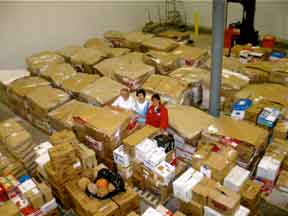
Nossack's warehouse
We met at Nossack's warehouse at 7 a.m.? Diana had the coffee on, and Darren arrived from Edmonton right on time.? The containers had been dropped off by Vic on Friday, and were ready to go. Darren, from Cratex in Edmonton, started working on the bracing for the Explorer in one container while the rest of us began loading the other container. ? Diana Vico (Nossack's warehouse person) was a mad woman on the powerjack, and the way she handled the loading was a thing of beauty.? Some of the pallets were brought to the loading area with the hand jacks and some Diana took by powerjack directly into the container.? Diana loaded four pallets at a time and then the rest of the area was hand bombed box by box.? Gradually the first container was filled.?Taking a break while loading are Dan Pottage and Chris Jones.
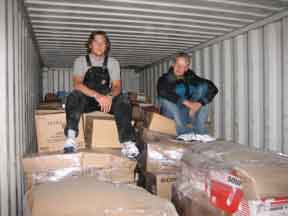
A full full container
After he first container was full we congratulated ourselves heartily!?? There was a real sense of satisfaction in closing that first container, and more than a few high fives.? While Vic?closed the first container and took it to his yard,?Craig steered the Explorer into place in the second container, and we hand bombed boxes around it.? Then Darren built a bulkhead to stop the load from shifting, and we proceeded to fill the second container.
We were done by about 11:15 a.m.? It really pays to have a crew that digs in heart and soul.? About twenty unclaimed bikes were donated by Red Deer RCMP, and they were loaded into free space near the top of the container.? In the end, we loaded sixty pallets with a total weight of 60,000 pounds.?The Explorer was about 4,000 pounds, so that means we collected, sorted, boxed, loaded and carted around about 56,000 pounds of books and school resources.? Not bad for two 58 year old women!!? When my son Dan walked in one Friday night, he commented that I had lost weight.? I had not taken the time to get on the scale for a month and a half, and lifting those boxes in the heat of this July was not altogether a bad thing.? I had lost 12 pounds!
We have learned a great deal about collecting books, containers and shipping in the last few months.? Getting the containers through the port in Tema may teach us a little more.? They seacans are now in the Cratex yard in Calgary, and once they are loaded on the rail cars for Montreal, Garry Vastila at Global Cargo Services is in charge.? He will assist us in getting the containers through the port in Ghana, at least that is the plan.
A year and a half of planning, and nine months of collecting is now complete.? On to step two....
Marilyn P.